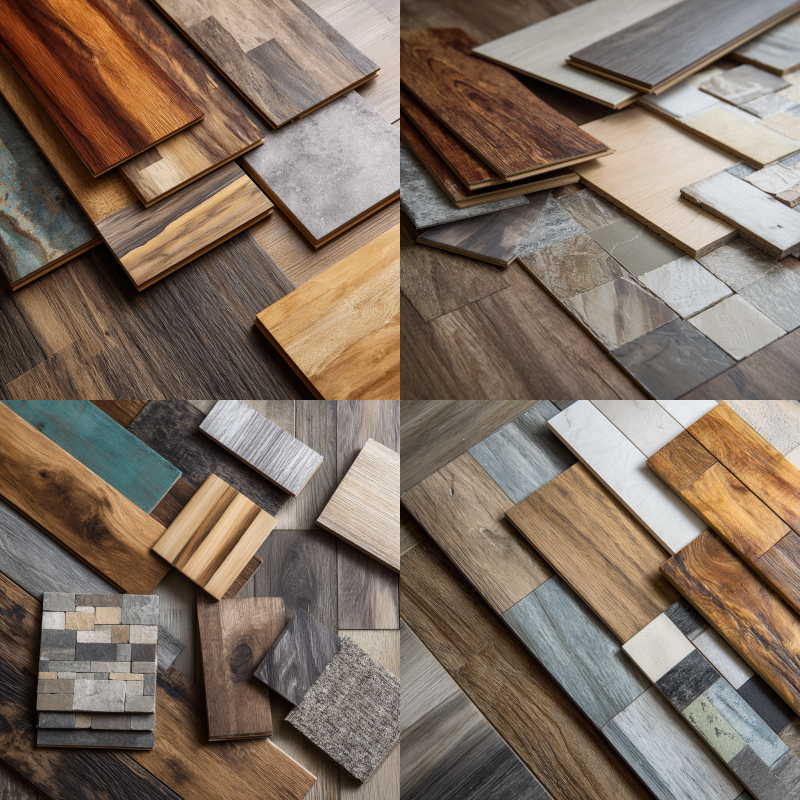
What You Need to Know Before Flooring Installation
When it comes to flooring installation, whether you’re working on a new home project or upgrading an existing space, it’s essential to be well-prepared. Flooring isn’t just something you walk on, it impacts your home’s aesthetics, functionality, and overall value. But here’s the thing: installing new floors is not just about picking a color or material. There’s a lot that goes into the process to make sure it’s done right.
Flooring installation requires careful planning, attention to detail, and, most importantly, the right team of flooring contractors. So, before you start this exciting project, there are several key factors you need to consider to ensure everything goes smoothly.
Key Considerations Before You Start
- Aesthetics: Your flooring setsthe tone for the entire space, influencing how your home feels and flows.
- Functionality: Choose the right type based on the room’s needs. For instance, waterproof flooring for bathrooms or durable wood floors for high-traffic areas.
- Home Value: High-quality, well-installed flooring can add significant value to your home, making it a smart investment.
For professional advice on selecting flooring that adds value, check out ourflooring services.
Choosing the Right Flooring Material
- Room Purpose: What will the room be used for? (e.g., high moistureareas need waterproof materials)
- Durability: How much foot traffic does the room get?
- Budget: Determine what works best within your price range.
- Style: Do you want a modern, classic, or natural aesthetic?
If you’re unsure about which material to choose, check out our guide onhow to choose the right flooring.
Selecting the Right Flooring Contractors
- Experience: A contractor with a proven track recordensures the job is done right.
- Reputation: Check reviews and ask for references.
- Budget Transparency: Ensure the cost is clear upfront with no hidden fees.
You can explore ourcontractor servicesfor more details.
Why Flooring Installation Isn’t Just a Simple Task
- Time and Effort:
Flooring installation is not a quick DIY job. Professional contractors can handle the technical aspects of flooring installation much faster and more efficiently than a beginner ever could. - Preparation:
Before any flooring installation begins, the floors need to be level, clean, and properly prepped. In many cases, the surface may require repairs or adjustments to ensure a successful flooring installation. - Tools and Skills:
Some flooring types, like hardwood or tile, require specific tools and a high level of expertise. Attempting flooring installation without the right equipment or knowledge can lead to costly mistakes. - Precision and Quality:
Proper flooring installation ensures long-term durability and aesthetic appeal. Uneven surfaces, gaps, or poor alignment can all result from rushed or inexperienced flooring installation. - Cost Efficiency:
Although hiring a professional might seem more expensive upfront, expert flooring installation often saves money in the long run by avoiding rework, wasted materials, or damage. - In short, flooring installation is more complex than it appears. To ensure quality results, it’s best to trust experienced professionals with your flooring installation needs.
Learn more about the importance of professional flooring installation services on ourservice page.
Essential Tips for a Smooth Flooring Installation Process
- Before starting your flooring installation, it’s important to make sure everything is set for a smooth process. Proper preparation can make a big difference in the quality and success of your flooring installation.
- Properly Prepare Your Space:
Clear the area completely before your flooring installation begins. Move furniture, cover nearby items, and ensure your contractor has easy access to the flooring installation site without any obstacles. - Inspect Subfloors:
The condition of your subfloors can greatly impact your flooring installation. Make sure they are clean, dry, and level. Any imperfections can lead to problems during or after the flooring installation process. - Set a Realistic Timeline:
Understanding the time needed for your flooring installation is key. While some materials take only a day or two to install, others may require more time. Always ask your contractor for a detailed flooring installation timeline and plan accordingly. - In short, successful flooring installation starts long before the first board is laid. Taking the time to prepare ensures a smoother and more durable flooring installation result.
Start With the Right Flooring Contractor
Choosing the right flooring contractors is crucial for a successful flooring installation. The contractor you hire will guide you in selecting the best materials, assess your space, and ensure everything is done with precision.
Why Is Hiring a Professional Flooring Contractor So Important?
Expertise and Experience
Flooring installation isn’t one-size-fits-all. Each material, from hardwood to vinyl, requires specific knowledge. A professional flooring installation expert brings years of experience and can handle all types of materials. With a solid understanding of various flooring installation methods, they ensure smooth, long-lasting results.
A skilled contractor guarantees high-quality flooring installation work, backed by a proven portfolio. Learn more about our flooring services.
Proper Equipment and Tools
Professionals use specialized tools for efficient and precise flooring installation. From cutting to leveling and bonding, these tools make a major difference in the outcome of your flooring installation. The right equipment helps avoid mistakes and ensures the flooring installation is done correctly the first time.
Attention to Detail and Design Precision
Flooring installation is not just about laying down materials—it’s about aligning everything to suit the room’s design. A professional contractor ensures accuracy and beauty in every flooring installation, whether you’re using intricate designs or traditional layouts. Check out our blog on flooring design for more design tips to complement your flooring installation.
Timeline Management
Managing time is crucial for successful flooring installation. Contractors organize materials, schedules, and team members to keep your flooring installation project on track. Delays are costly, so having an expert ensures your flooring installation progresses efficiently.
Minimizing Disruptions
Experienced contractors aim to make your flooring installation as smooth as possible. They reduce noise, mess, and stress during the process. From setup to cleanup, a professional ensures your flooring installation is completed with minimal impact on your daily life.
Safety and Code Compliance
A proper flooring installation follows safety protocols and building codes. Licensed professionals understand these requirements, from moisture control to slip resistance. You can trust that your flooring will be safe and legally compliant. Explore our home construction services for more details on compliance.
Choose the Right Luxury Flooring Products
Selecting the right flooring type is one of the most crucial decisions in any renovation or new flooring installation project. With so many options on the market today, it’s important to choose a material that will not only look great but also withstand the demands of your lifestyle.
Luxury flooring options, such as hardwood, vinyl, and engineered wood, are popular for their blend of durability and style. However, each type comes with its own unique set of benefits and drawbacks, making it essential to consider both aesthetic preferences and functional needs when deciding.
Factors to Consider When Choosing Your Flooring Material
Room Functionality
Consider the purpose of the room. High-traffic areaslike hallways, kitchens, and living rooms require flooring that can stand up to wear and tear, while quieter spaces like bedrooms or offices may benefit from softer materials like carpet or cork.
Durability
How long do you expect the flooring to last? Hardwood floors, while stunning, may require more maintenance, while vinyl or engineered wood can be more resilient to spills and heavy foot traffic. For commercial spaces or high-traffic areas, opting for professional flooring services that offer durable materials can ensure longevity and less wear over time.
Maintenance Needs
Think about how much time you want to spend cleaning and maintaining your floors. Hardwood floors need occasional refinishing, while vinyl flooring only needs a regular sweep and mop to maintain its appearance. If you’re considering residential and commercial flooring, it’s essential to choose materials that can handle the wear of daily activities, with minimal upkeep required.
Climate Considerations
The climate of your area can influence your choice. Humid climates, for example, may not be ideal for traditional hardwood, which can warp over time. Engineered wood or vinyl may be better suited to withstand these conditions, especially for residential and commercial flooring projects in areas with temperature fluctuations.
Consider the Look and Feel of Your Floors
Aesthetic Appeal: Form Meets Function
- Luxury floors such as engineered wood or high-quality vinyl can immediately elevate the look of your home. These materials are not only stylish but also highly durable. Engineered wood, for example, has the beauty and elegance of traditional hardwood but is more resistant to moisture and temperature changes, making it perfect for kitchens, bathrooms, or basements.
- Vinyl, on the other hand, offers a sleek and modern aesthetic and comes in a variety of designs that can mimic the look of wood, stone, or tile. It’s also an excellent choice for those on a budget but still looking for high-end style.
The Feel Underfoot: Comfort and Practicality
- Different flooring materials offer varying degrees of comfort underfoot. Hardwood and engineered wood provide a solid, smooth surface that feels great to walk on, though they can be cold in winter months unless paired with heating.
- Vinyl floorsare soft underfoot, especially if you choose options with padding. For extra comfort in spaces like living rooms or bedrooms, consider carpet for its cozy and plush feel.
High-Traffic Areas vs. Quiet Spaces
- Are you planning for high-traffic areas like living rooms or hallways, or a quieter space like a bedroom or home office? The level of activity in the room can greatly influence the type of flooring you choose.
- High-traffic areas require materials that are both durable and easy to clean. Hardwood and vinyl are excellent for this, as they can withstand the pressure and daily use.
Natural Look vs. Modern Design
- Do you prefer a natural look, like the warm tones of hardwood, or are you leaning toward a modern design with sleek, industrial-style floors like polished concrete or tiles?
- The right flooring can help you achieve the vibe you want. Hardwood is timeless and adds a natural beauty, while vinyl can give you the sleek, contemporary look you desire, with options that mimic natural materials at a fraction of the cost.
The Role of a Flooring Contractor in Guiding Your Decision
A professional flooring contractor can be an invaluable resource in helping you choose the best flooring material for your home. They can provide insights into how different materials perform in specific spaces, and they’ll know the latest trends and innovations in flooring.
An experienced contractor can guide you in choosing a material that not only complements the design of your home but also suits your lifestyle needs.
To explore more about your flooring options or to get expert advice, feel free to check out ourflooring servicesand get started with your project today.
What to Consider Before Scheduling Your Floor Installation
Before scheduling your flooring installation, take the time to evaluate your space and prepare accordingly. Proper preparation ensures that your new floors will be installed seamlessly and efficiently. Here are some key steps to follow:
Finalize Your Design Plans for Moldings and Baseboards
Before flooring installation day, work with your contractor to select moldings and baseboards that match your flooring choice. Properly finished edges can elevate the look of your floors and help with long-term durability. Moldings and baseboards help hide the gap between the floor and the walls, so the right style can make a big difference in the final appearance.
Plan to Replace or Rewire Cables
If your flooring project requires electrical changes (like additional outlets), ensure that cables are replaced or rewired before installation begins. This is particularly important for spaces like kitchens and bathrooms where wiring could be impacted by new flooring materials.
Consider the Size of Your Current or New Doors
When selecting flooring, consider whether your doors will need to be adjusted. Sometimes, thicker floors may require doors to be trimmed to fit. A good flooring contractor will assess this before installation, helping you avoid last-minute surprises.
What to Do Before Installation Day
Preparation is key before the flooring installation crew arrives. Make sure the space is clear and clean. This will give the contractors full access to the area and ensure that the job gets done without delays.
Remove All Furniture and Breakable Items
Furniture can be heavy and cumbersome, so make sure to remove or relocate all furniture and delicate items from the space where the flooring is being installed. This will give your contractors a clear, safe area to work.
Clean the Area for Optimal Installation
A clean workspace is essential for a successful installation. Sweep and vacuum the area to remove dust and debris, allowing the new flooring to be laid properly. If any underlying surface issues need attention (like creaky floors or minor damage), ensure they’re addressed ahead of time.
What to Do on Installation Day
On installation day, make sure to protect your furniture, and keep children and pets out of the installation area. Flooring contractors will need full access to complete the job, so be sure your home is ready to accommodate them.
Be ready to address any questions or concerns that may arise during the installation. Your contractors may need to discuss final adjustments, and it’s better to be available for quick decisions.
Homeowner’s Flooring Installation Prep Checklist
Before your flooring installation begins, it’s important to follow a checklist to ensure everything goes smoothly:
- Remove Breakable Items: Clear the floor area of any items that could be damaged during installation.
- Disconnect Gas, Appliances, and Electronics: If necessary, disconnect appliances and gas lines before installation.
- Clean the Nooks and Crannies: Ensure that the surface is clean and free of debris.
- Clean the Floors: Even if you’re replacing old floors, the area should be cleaned for optimal installation.
For additional help, check out ourflooring services.
Guide to Flooring Types: Engineered Wood, Hardwood & CeramicFlooring Types
- Engineered Wood: Ideal for areas with fluctuating humidity levels. Engineered wood has a more stable structure than traditional hardwood, making it a great option for basements or bathrooms.
- Hardwood Floor: Classic and durable, hardwood floors add warmth and charm to any home. It’s the preferred choice for high-end homes due to its timeless appeal.
- Ceramic: A versatile and stylish option, ceramic tiles are great for bathrooms and kitchens. They are resistant to water and stains, making them a low-maintenance option for wet areas.
- Vinyl: Easy to maintain and affordable, vinyl is perfect for high-traffic areas. It’s available in various styles that mimic natural wood or stone.
- Carpet: Soft and cozy, but requires regular maintenance and cleaning. Carpet is best suited for bedrooms and living areas where comfort is a priority.
What to Do Before Installing New Flooring?
Proper preparation is essential to ensure a successful flooring installation. Here are a few key steps to take:
Site Assessment
It’s important to assess the condition of your floors and subfloors before installation. This ensures that your new flooring will last long without issue. A professional flooring service can help with this, inspecting the area for damage, moisture issues, or structural problems.
Removing Existing Flooring
If you’re replacing old floors, ensure that it’s removed properly to avoid complications during the new installation. This may involve taking up carpet, tile, or previous wood floors, as well as ensuring that the subfloor is in proper condition.
Flooring Installation – Key Things to Know Before Starting
Understanding all aspects of flooring installation is crucial for a successful and stress-free project. From choosing the right materials and contractors to preparing your home, proper planning is essential. By following the right steps, you can ensure your new floors are installed correctly and add long-lasting value to your home.
Remember, a well-planned flooring installation project will increase the functionality, beauty, and value of your home, but only if done right. Always hire experienced flooring contractors and professional flooring services to ensure the best results.
Ready to Transform Your Home?
At Mazzamuto Construction, we believe great spaces start with thoughtful planning and skilled craftsmanship. Whether you’re exploring ideas or ready to build, our team is here to guide you every step of the way. Let’s bring your vision home—reach out for a personalized consultation today!
Frequently Asked Questions
1. How do I install hardwood floors?
For professional advice on hardwood floor installation, check out our flooring services.
2. How much to install hardwood floors?
The cost of installing hardwood floorsdepends on various factors. Get an estimate for your project.
3. How much is hardwood flooring installation cost per square foot?
The cost of hardwood flooring installation typically ranges from $6 to $12per square foot,depending on factors such as the type of wood, the complexity of the layout, and your location.
4. How much does tile installation cost?
Tile installationusually ranges from $7 to $15 per square foot. The final price depends on the type of tile you choose, the size of the area, and how complex the layout is. Specialty tiles, intricate designs, or difficult-to-access areas can increase labor costs.
5. How much does new flooring cost?
The cost of new flooringdepends heavily on the material. On average, vinyl and laminate flooring cost between $2 to $7 per square foot, carpet ranges from $3 to $8 per square foot, hardwood from $6 to $12, and tile from $7 to $15 per square foot.
6. How to get a flooring estimate?
Getting a flooring estimatestarts with measuring the area where you want to install new floors. Next, choose your desired flooring material and finish. After that, you can contact a local flooring contractor or provider and request a quote.
7. Where can I get flooring samples?
Flooring samplesare available at most flooring retailers, home improvement stores, and online flooring shops. Many companies offer a wide range of samples to help you compare colors, textures, and finishes before making a decision.
8. How can I get free flooring samples?
Many flooring companies offer free flooring samples, especially online retailers. These are often available as part of promotional offers or trial kits. Some stores may offer complimentary samples in-store or allow you to order a limited number for free online.
Key Takeaways
- Professional flooring services are essential for a smooth flooring installation.
- Understand the flooring options available before making a choice.
- Pre-installation preparation will save time and reduce stress.
- Work with experienced flooring contractors to ensure the best outcome.
- Always get an all-inclusive quote before proceeding with the project.




